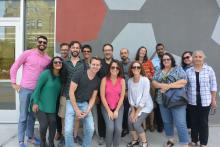The Democracy at Work Institute has created a fellowship program to support the current and next generation of worker cooperative development leaders and their organizations to engage with the question of scale: what does scale mean, how can coop developers incorporate approaches to scale in their work, what tools and relationships are needed to build scale?

As cities across the U.S. are looking to worker cooperatives as a form of job creation and wealth building, DAWI took our fellows on a study trip to Winnipeg, Manitoba, Canada, where worker cooperatives have been integrated into the larger ecosystem of community economic development for nearly two decades. Nine fellows spent three days in Winnipeg, June 26-28, 2015, focusing on scale building through local initiatives.
Fellows from New York City, Maine, Denver, Oakland and Washington State:
- toured SEED Winnipeg, a small business development center that launches worker cooperatives as part of a larger strategy of business development and asset building. SEED is led by Cindy Coker, founder and former executive director of the successful ChildSpace Management Group in Philadelphia.
- were inspired by the innovative policy and partnership strategies shared by Vera Goussaert, executive director of the Manitoba Cooperative Association. MCA has launched tax credits for cooperative equity investments and has rallied the leaders of producer, consumer and worker cooperatives to fund a Chair of Cooperative Development in the University of Winnipeg’s Business Department – the first of its kind in North America.
- stretched their thinking on principles of development, after meeting with Sherman Kreiner, managing director of the Winnipeg Community Renewal Corporation and former cooperative developer working with large-scale cooperative development efforts in the US including the O&O groceries, ChildSpace Management Group and Cooperative HomeCare Associates. Sherman has led the University in committing to the four pillars of sustainability – environmental, social, economic and cultural. As an example, and in partnership with SEED Winnipeg, the University has launched a social enterprise, Diversity Foods, which provides healthy food for the entire University system.
At its foundation, the purpose of this DAWI study trip was to learn from the experiences of cooperative developers who have been doing this work over time. "Stories, and the sharing of experiences, are some of the most powerful tools in this training. [The Fellowship] has given me so many stories to tell clients, peers, and participants. And, coming out of this trip, I have new ideas to incorporate into my programing including ecosystem building, policy work, effective education tools, and management." - Ricardo Nuñez, Sustainable Economies Law Center
